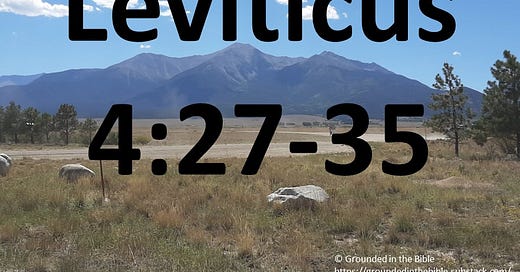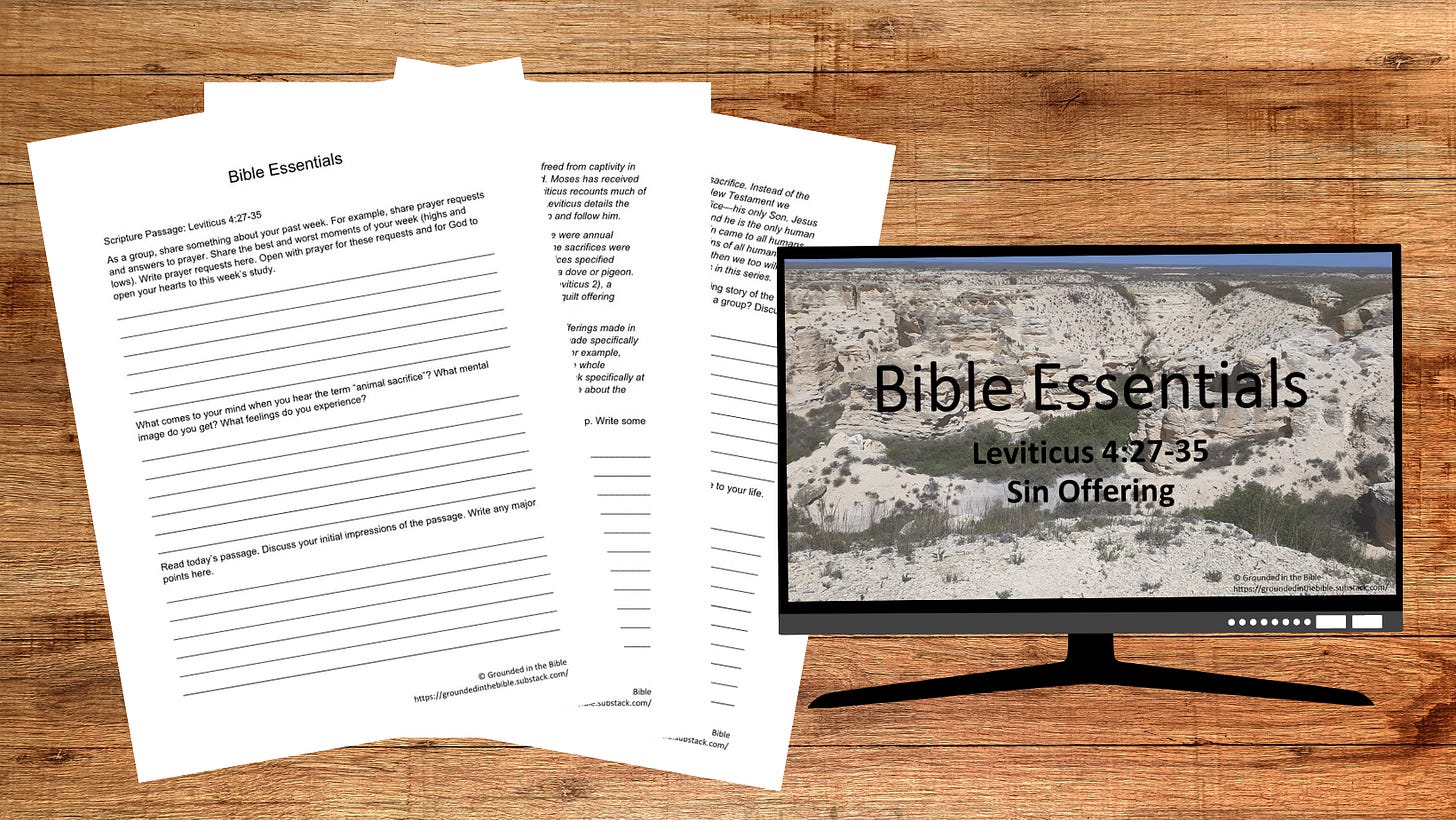Opening
Individuals: Take time to think back about your past week. Where have you seen God work in your life or answer prayer? Write down any prayer requests you have.
Group: Open the study by sharing life updates, reviewing highs and lows of your past week, or sharing prayer requests and praises.
Icebreaker: What comes to your mind when you hear the term “animal sacrifice”? What mental image do you get? What feelings do you experience?
All: Begin the study with a word of prayer, asking God to open your heart for today’s study. You can also pray for any prayer requests now, or save that for the end.
Study
Read today’s passage: Leviticus 4:27-35.
27 “‘If any member of the community sins unintentionally and does what is forbidden in any of the Lord’s commands, when they realize their guilt 28 and the sin they have committed becomes known, they must bring as their offering for the sin they committed a female goat without defect. 29 They are to lay their hand on the head of the sin offering and slaughter it at the place of the burnt offering. 30 Then the priest is to take some of the blood with his finger and put it on the horns of the altar of burnt offering and pour out the rest of the blood at the base of the altar. 31 They shall remove all the fat, just as the fat is removed from the fellowship offering, and the priest shall burn it on the altar as an aroma pleasing to the Lord. In this way the priest will make atonement for them, and they will be forgiven.
32 “‘If someone brings a lamb as their sin offering, they are to bring a female without defect. 33 They are to lay their hand on its head and slaughter it for a sin offering at the place where the burnt offering is slaughtered. 34 Then the priest shall take some of the blood of the sin offering with his finger and put it on the horns of the altar of burnt offering and pour out the rest of the blood at the base of the altar. 35 They shall remove all the fat, just as the fat is removed from the lamb of the fellowship offering, and the priest shall burn it on the altar on top of the food offerings presented to the Lord. In this way the priest will make atonement for them for the sin they have committed, and they will be forgiven.
What is the context for this passage?
At this point in the history of the Bible, the Israelites have been freed from captivity in Egypt, and they have started their journey to the Promised Land. Moses has received the 10 Commandments and the rest of the law. The book of Leviticus recounts much of the law that God has given the Israelites to follow. In particular, Leviticus details the sacrifices that God expects the Israelites to make as they worship and follow him.
The Israelites had a list of many sacrifices to make. Some of these were annual sacrifices. Some were more frequent. Some were as needed. Some sacrifices were grain or oil sacrifices. Some were animal sacrifices; different sacrifices specified different animals, such as a bull, a male or female goat, a lamb, or a dove or pigeon. Sacrifices included a burnt offering (Leviticus 1), a grain offering (Leviticus 2), a fellowship offering (Leviticus 3), a sin offering (Leviticus 4-5), and a guilt offering (Leviticus 5-6).
The burnt offering, grain offering, and fellowship offering were food offerings made in worship to God. However, the sin and guilt offerings were sacrifices made specifically due to sin. Leviticus specifies different offerings for different people. For example, different sacrifices were given depending on who sinned: the priest, the whole community, a leader, or a member of the community. Today, we will look specifically at the sin offering for a member of the community. If you want to read more about the other types of sin offerings, you can read Leviticus 4:1-5:13.
Read the passage again.
Explore a different version if you have one available. If you are online, here is Leviticus 4 in NIV through Bible Gateway. You can change the version by using the dropdown menu at the top right of the page.
Try to summarize the passage in your own words.
Answer these three questions about the passage:
1. What does the passage say about God?
God gives commands to his people. From the very beginning, God laid out his expectations for people. For Adam and Eve in the garden, it was a single command: Don’t eat from the tree of knowledge of good and evil. When that one command was broken, God greatly expanded his commands for people. These commands are given in the books of the law: Exodus, Leviticus, Numbers, and Deuteronomy.
God requires a sacrifice when his commands are broken. God knew that humans would go against his commands, so he gave instructions for what to do when that happened. If anyone does what is forbidden in God’s commands, they must offer a sacrifice. This sacrifice would make atonement for their sins. This atonement helps repair the damage that was done in the relationship between God and man.
God requires a perfect sacrifice for sin. God required his people to bring a sacrifice when they sinned against him and broke his commands, but it couldn’t be just any sacrifice. God wouldn’t accept the weakest sheep or goat in the flock. He required that the sacrificial animal be perfect, without defect.
God forgives his people when they repent. If people offer a sacrifice for their sins using the guidelines that God has provided, then God promises to forgive those sins. He won’t hold that sin over that person any longer. This shows God’s mercy for his people.
2. What does the passage say about people?
People can sin unintentionally. We all know that people can sin intentionally. We often make the choice to sin. But we can also sin unintentionally. Maybe we don’t know that what we did was wrong, or we get so caught up in the moment that we don’t really make a conscious decision to act in a way that is displeasing to God. Whether sin is intentional or unintentional, it is still wrong, and God will still count that sin against us if we don’t repent.
People can realize their own guilt. God made humans with a conscience that helps us decipher between right and wrong. For Christians, the Holy Spirit can guide us to recognize our sin. Sometimes, God uses other people or a written law to inform us of our sins. We all know what it feels like to have the burden of guilt on our minds after we’ve done something wrong. But what do we do with that guilt? Does that guilt lead you to repentance? Or do you continue to sin anyway?
People must pay a penalty for their sin. Whether here on this earth or later in eternity, people must pay a penalty for their sin. In this passage, the requirement was to offer a sacrifice as atonement for their sin. The people were to bring a female goat or lamb as a sacrifice—and not just any goat or lamb, but one without defect.
3. What does the passage say about God’s plan?
God’s plan was that a substitute would pay the penalty for sin. God knew that humans would sin, and his penalty for sin is death. But if every person paid the penalty of death as soon as they sinned, the human race wouldn’t last more than a generation. Therefore, God developed a way for humans to use a substitute sacrifice to pay the penalty for their sins.
God’s plan was that a sacrifice would provide a way for forgiveness of sins. When we sin, we sin against God first and foremost. The goal of offering a sacrifice for sins is to obtain God’s forgiveness. The sacrifice allows God’s wrath for sin to be appeased, and in his mercy, he forgives us when we repent. This allows the broken relationship between God and man to be restored.
How does the passage fit into the overarching story of the Bible?
Sometimes it’s easier to understand a passage if you have a little outside knowledge from other passages in the Bible. This section will help provide that outside perspective.
The idea of sacrifice for sin is central to understanding the Bible. The Bible makes it clear that all humans are sinners, that the penalty for sin is death, and that the only way to remove that penalty is for a substitute to die in place of the person. In the Old Testament, that substitute was an animal. In our text today, the substitute was a female goat or female lamb. This process of sin and sacrifice was carried out through the entire Old Testament.
In the New Testament, we see that God has another plan for sacrifice. Instead of the frequent animal sacrifices found in the Old Testament, in the New Testament we become aware that God has planned one final substitute sacrifice—his only Son. Jesus was the perfect sacrifice because he was both God and man, and he is the only human to have ever lived a sin-free life. The Bible tells us that just as sin came to all humans through one man, Jesus will be one final sacrifice to cover the sins of all humans (Romans 5:15). If we accept that sacrifice for sins on our behalf, then we too will be forgiven. We’ll look at this concept in more detail in future lessons in this series.
Discussion
Individual: Answer the following questions thoughtfully for yourself.
Group: Pose these questions for discussion.
All: If you are willing to share, I’d love to hear your thoughts to these questions. Feel free to use the comment section to start a discussion about this passage.
What else strikes you about this passage?
How does the passage affect how you view God? How you view yourself?
How does this passage affect how you will live your life?
Additional Study
For additional study related to this topic, read Leviticus 6:24-30 and Hebrews 10:1-18.
Premium Resources
For Bible Essential studies, you can use my thoughts as your devotional, or you can download and use the journaling sheet to work through the passage on your own. If desired, you can then compare your thoughts to mine. Journal sheets can be downloaded and used now or later. They can be printed and filled in by hand or saved and filled out electronically. Journal sheets are available for individual or group use.
If you plan to lead a group study, a PowerPoint presentation is also available.
You can access these resources by clicking here: Leviticus 4 Resources






